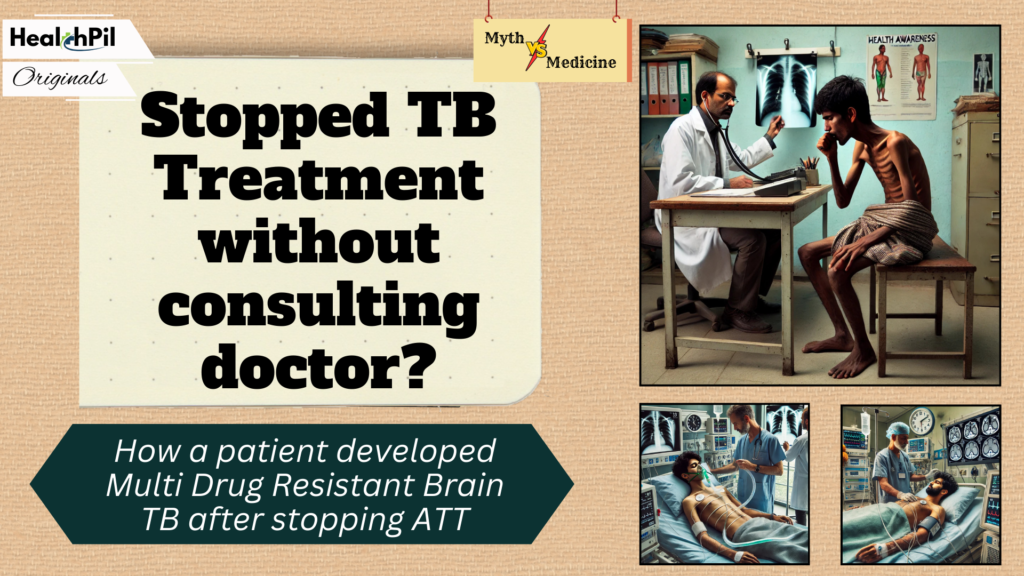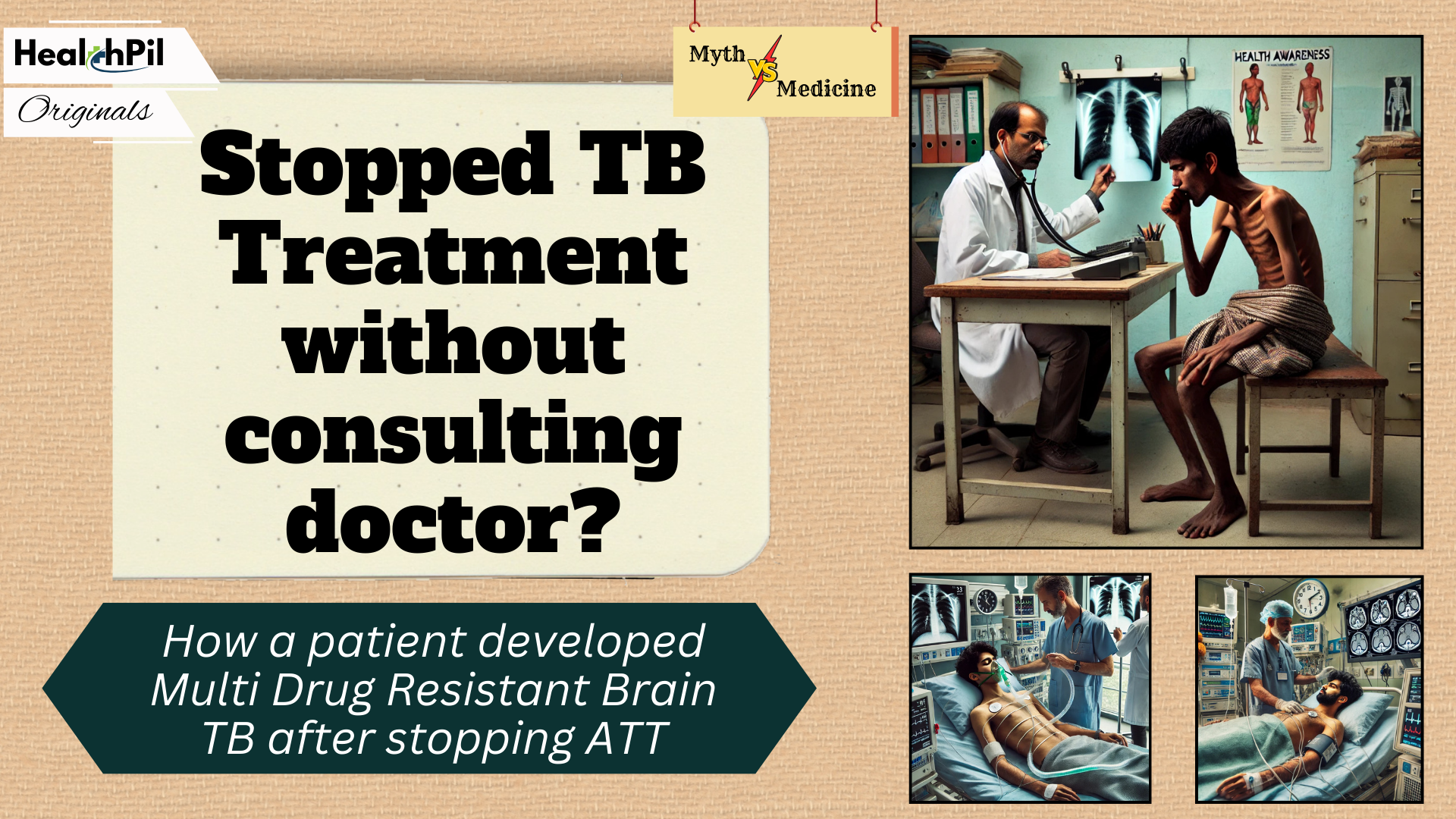
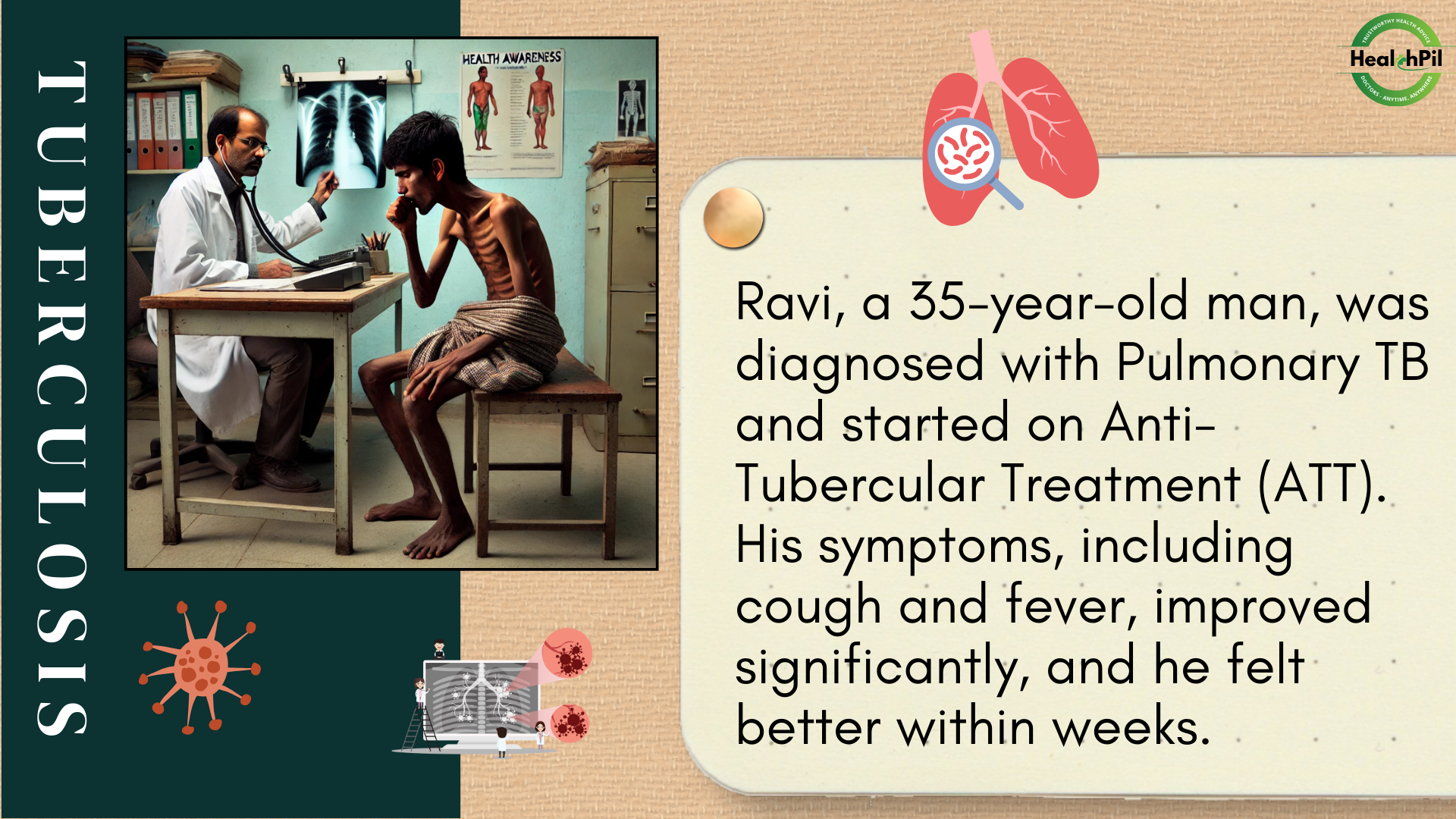
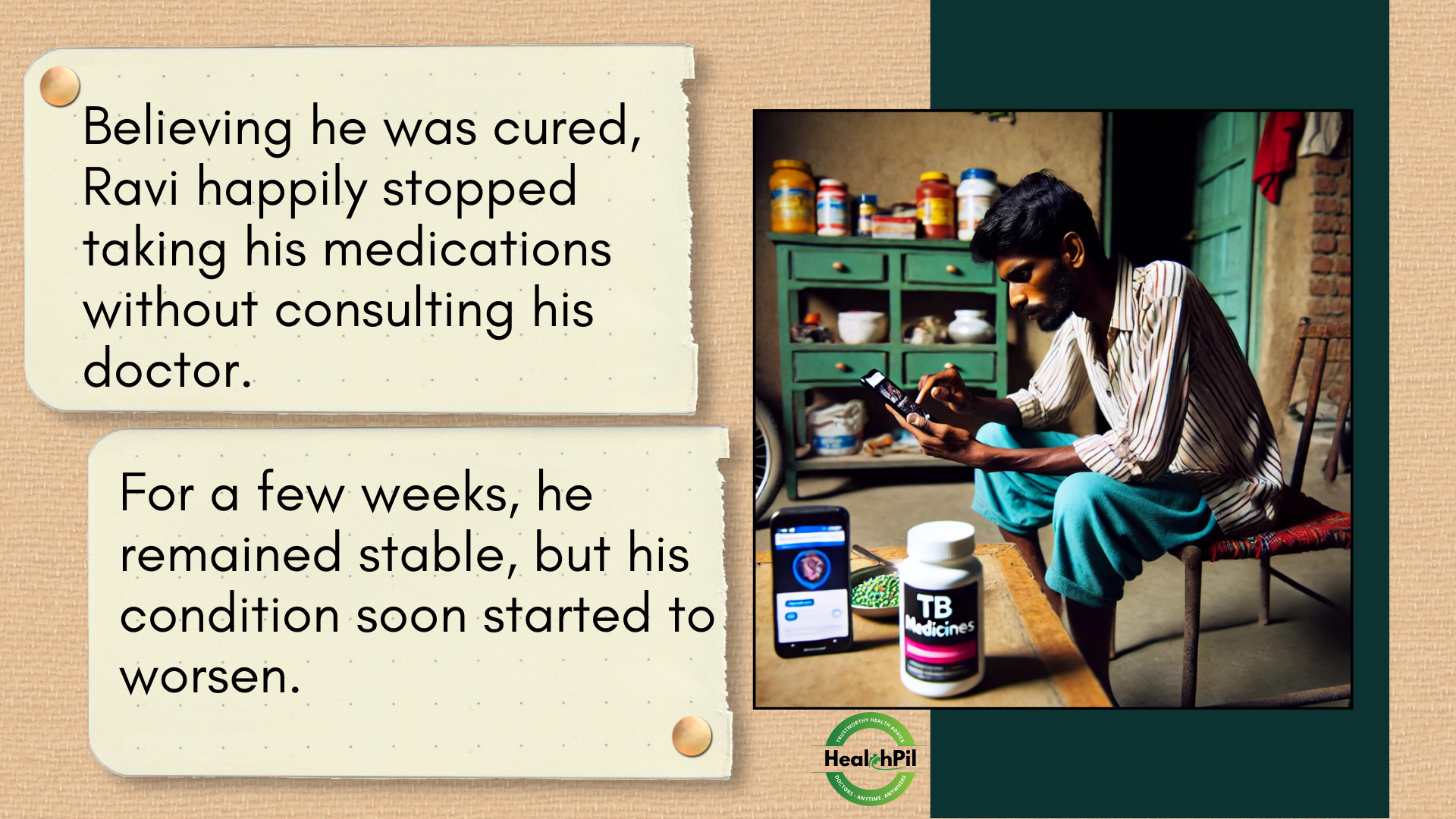
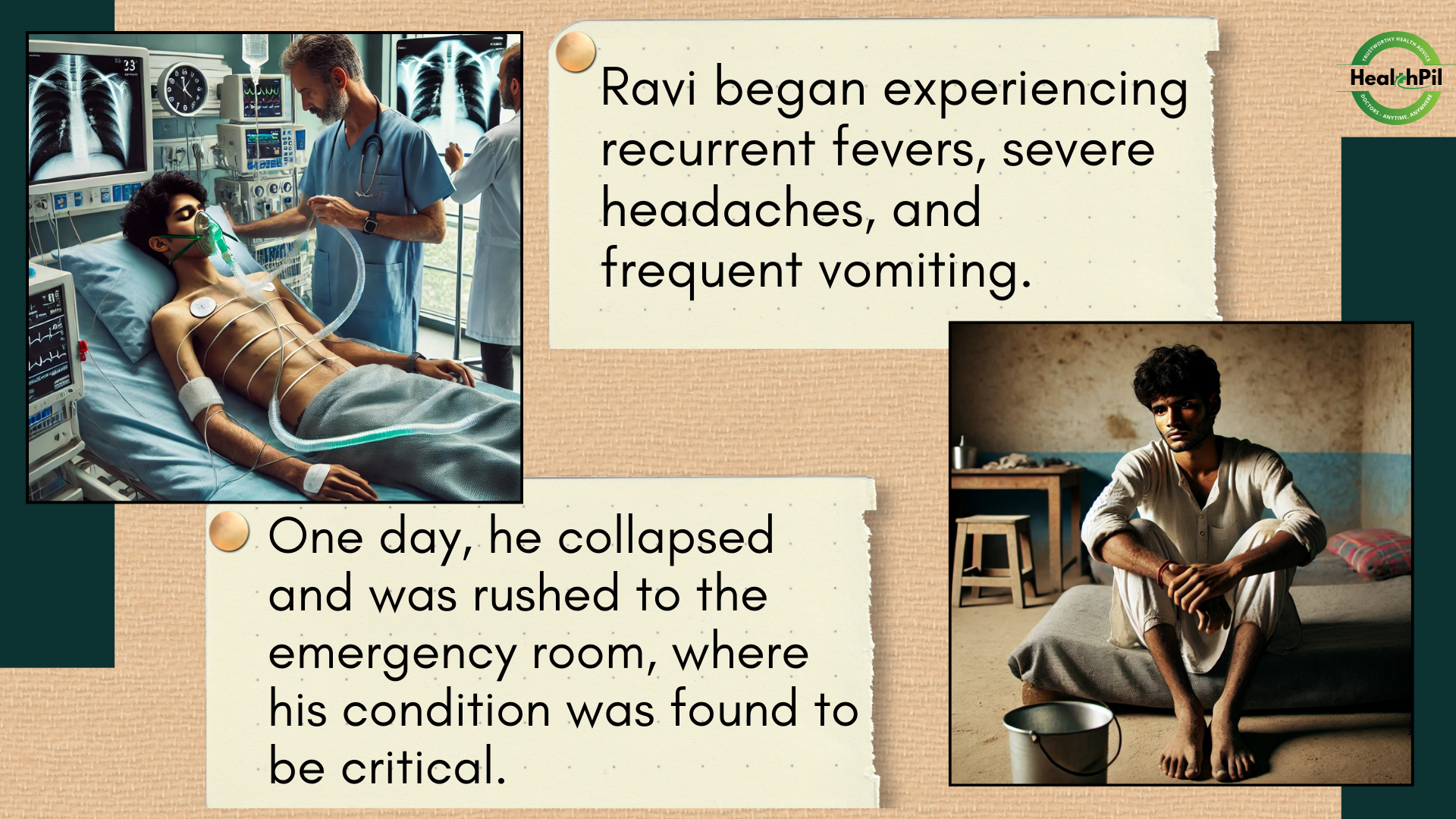
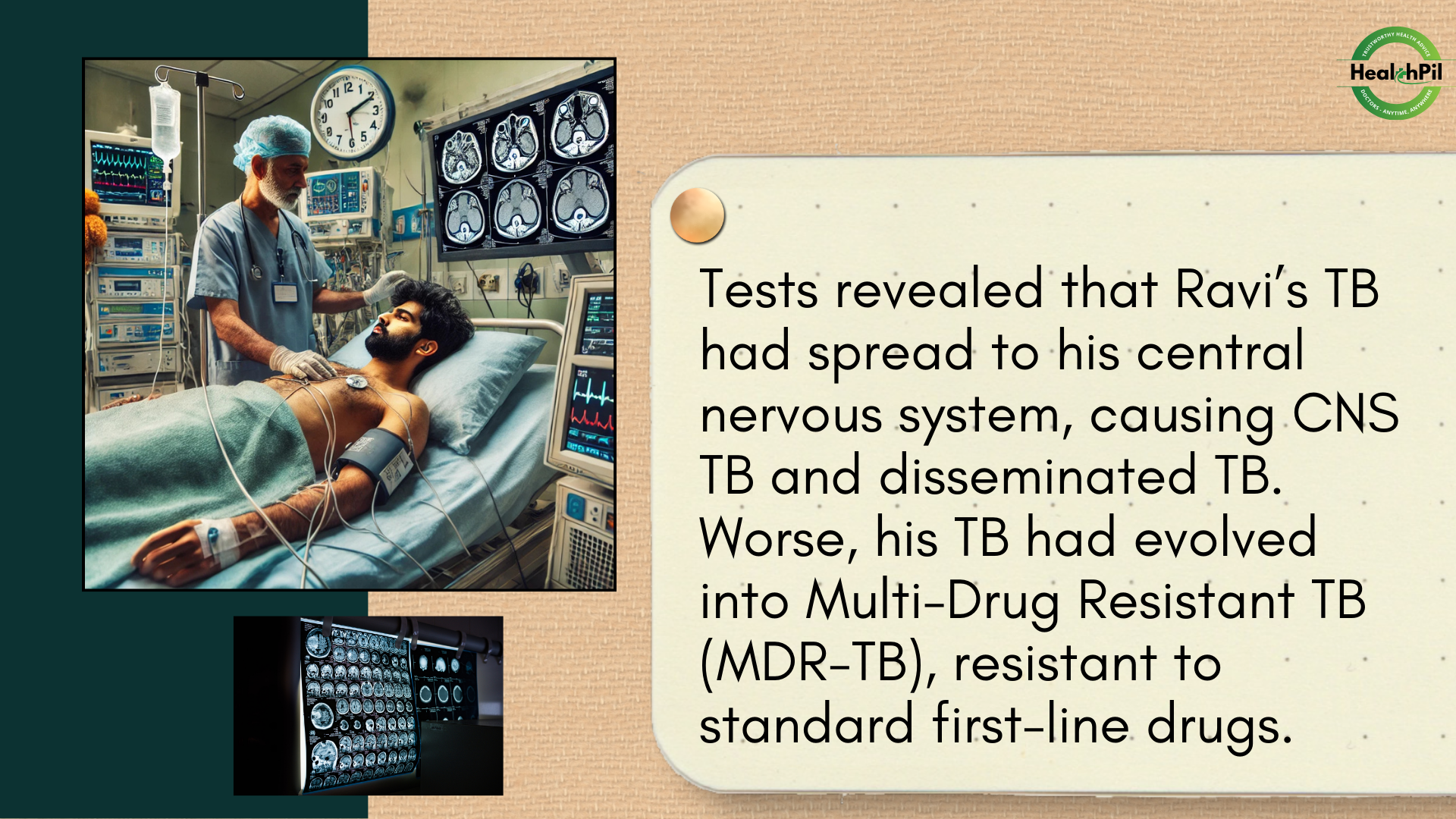
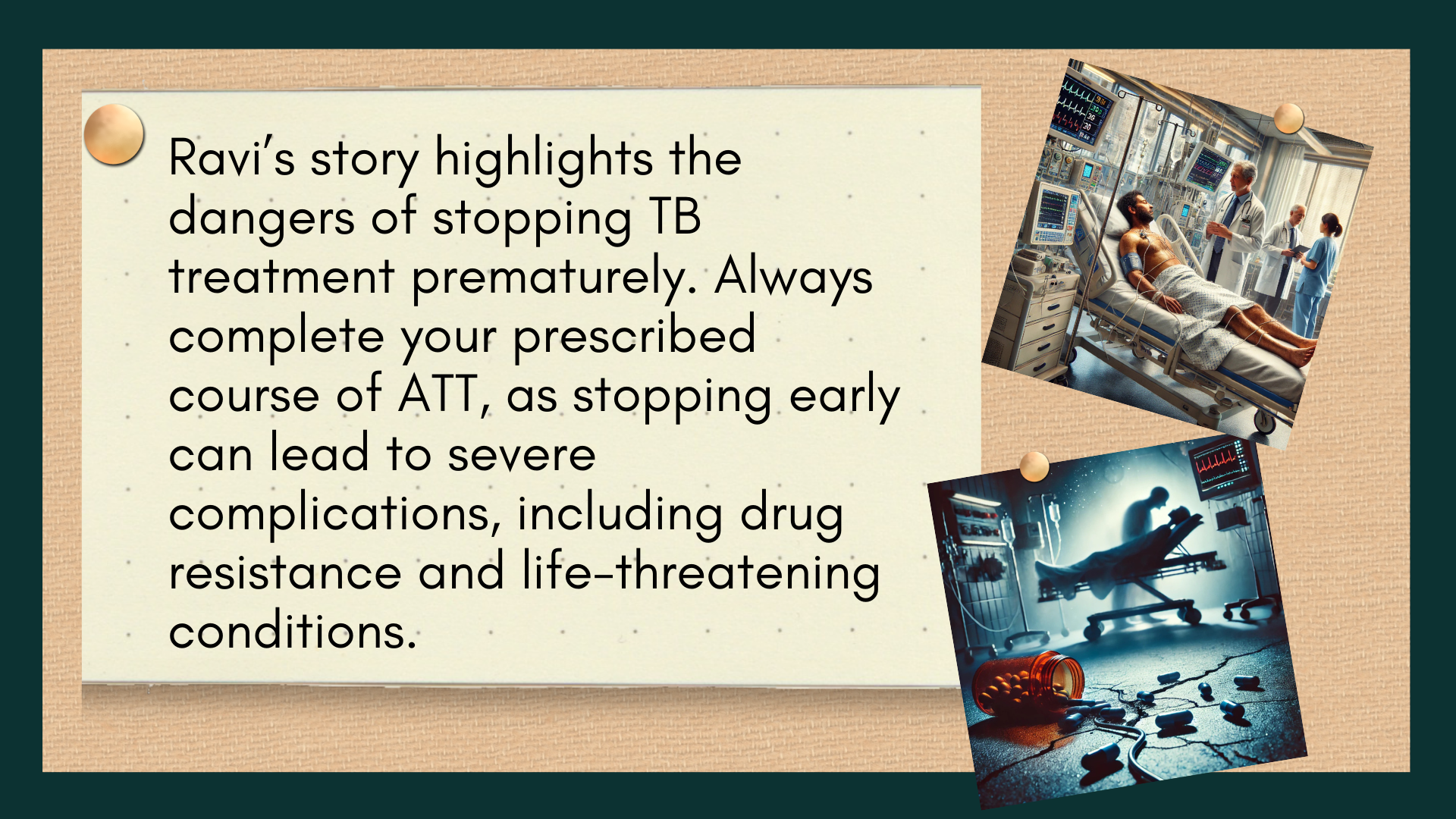

Tuberculosis (TB) is a severe infection that primarily affects the lungs but can also infect other parts of the body, including the brain and spinal cord. Failing to complete TB treatment or stopping medications midway can lead to life-threatening complications such as Multi-Drug Resistant TB (MDR-TB) and spread of TB to other systems including CNS TB (Central Nervous System TB), which are much harder to treat and pose significant health risks.
A Patient’s Story: How Stopping TB Treatment Early Led to a Life-Threatening Condition
Ravi (name changed), 35 years old, was diagnosed with Pulmonary TB a few months ago. His doctor started him on the standard Anti-Tubercular Treatment (ATT), the most effective treatment for TB. Initially, Ravi’s symptoms improved—his cough and fever subsided, and he felt better. Believing he was cured, Ravi decided to stop taking his medications without consulting his doctor.
For a few weeks, everything seemed fine, but then Ravi’s condition started to deteriorate. He developed recurrent fevers, severe headaches, and frequent vomiting. One day, Ravi collapsed and was rushed to the emergency room. After several tests, the doctors discovered that his TB had spread to his central nervous system (CNS), resulting in CNS TB and disseminated TB. Worse, Ravi’s TB had now evolved into Multi-Drug Resistant TB (MDR-TB), which is resistant to the standard first-line drugs used to treat TB.
What is Tuberculosis (TB)?
Tuberculosis (TB) is an infection caused by Mycobacterium tuberculosis, primarily affecting the lungs. However, infection can also occur to other parts of the body, including the bones, kidneys, and brain. When left untreated or improperly treated, TB can become highly dangerous.
Common Symptoms of Pulmonary TB:
● Persistent cough lasting more than three weeks (may include coughing up blood)
● Sudden weight loss
● Fever and night sweats
● Fatigue and weakness
Symptoms of CNS TB (TB of the brain and spinal cord):
● Severe headache
● Vomiting
● Fever
● Confusion or altered mental state
● Vision loss or impairment
The primary treatment for TB is Anti-Tubercular Treatment (ATT), which requires taking a combination of medications for 6-9 months. If patients stop their treatment prematurely, it can lead to the development of Multi-Drug Resistant TB (MDR-TB), which does not respond to standard TB medications and requires more potent and complex drugs for a longer period.
The Consequences of Stopping TB Treatment Early
In Ravi’s case, stopping his TB medications midway allowed the infection to spread beyond his lungs into his CNS, leading to disseminated TB—a condition where the bacteria spread throughout the body, affecting multiple organs.
Eventually his TB evolved into MDR-TB (Multi-Drug Resistant TB). This form of TB occurs when the bacteria become resistant to the standard TB drugs like Isoniazid and Rifampicin, making it much harder to treat and requiring more potent, toxic, and expensive second-line medications.
Proper TB Treatment and Prevention Measures
1. Complete Your Anti-Tubercular Treatment (ATT) Course:
TB treatment must be followed strictly for the full 6-9 months duration. Missing even one dose or stopping medications early can lead to the relapse of the infection, putting the patient at risk of MDR-TB.
2. Never Ignore TB Treatment, Even When You Feel Better:
Patients often stop their TB medications when they begin to feel better. However, this is dangerous because it allows the infection to become stronger and potentially drug-resistant. Always complete the entire course of treatment.
3. Take Preventive Measures to Avoid MDR-TB and CNS TB:
MDR-TB is much harder and longer to treat, requiring more toxic medications. To avoid MDR-TB, compliance of treatment is really necessary.
4. Isolation and Precautionary Measures for TB Patients:
TB is highly contagious and spreads through the air. TB patients must take precautions like wearing masks and avoiding close contact with others until they are no longer infectious.
What Happens if TB Treatment is Stopped Early?
1. Multi-Drug Resistant TB (MDR-TB):
Stopping TB medications early leads to MDR-TB, where the bacteria become resistant to first-line TB medications like Isoniazid and Rifampicin. Treating MDR-TB requires stronger, more toxic medications and a much longer treatment period, often lasting 18-24 months.
2. CNS TB and Disseminated TB:
When TB is left untreated or improperly treated, it can spread to the brain and spinal cord, causing CNS TB. Symptoms include severe headaches, vision problems, confusion, and sometimes coma. Disseminated TB means that the bacteria have spread to multiple organs, causing a widespread infection that is much harder to treat.
3. Death:
If MDR-TB and CNS TB are not treated promptly, they can become life-threatening. Immediate and proper treatment is essential to prevent fatal complications.
Beware of Social Media Myths about TB Treatment
With the rise of misinformation on social media, many people are misled into believing that home remedies or natural therapies can cure TB. This is false. TB can only be treated with Anti-Tubercular Treatment (ATT), and failing to follow the prescribed treatment plan can have fatal consequences.
How Can HealthPil Help You?
If you or someone you know is suffering from TB or any other health concern, you can connect with expert doctors on HealthPil. You can ask questions, get second opinions, and ensure you are on the right treatment plan—all for free.
FAQs (Frequently Asked Questions)
What are the symptoms of TB?
Common TB symptoms include a persistent cough, fever, weight loss, and night sweats.
How is TB treated?
TB is treated using a combination of antibiotics known as Anti-Tubercular Treatment (ATT), which must be taken for 6-9 months.
What is MDR-TB?
MDR-TB (Multi-Drug Resistant TB) is a form of TB that does not respond to standard medications like Isoniazid and Rifampicin, making it much harder and longer to treat.
What is CNS TB?
CNS TB occurs when TB bacteria infect the brain and spinal cord. Symptoms include headaches, confusion, vision problems, and in severe cases, coma.
Can I stop my TB treatment if I feel better?
No, stopping TB treatment prematurely is dangerous and can lead to MDR-TB. Always complete the full course of treatment as prescribed by your doctor.
Disclaimer:
This article is for educational purposes only and is not an alternative for professional medical advice. If you have any health concerns regarding TB, please consult a doctor.

